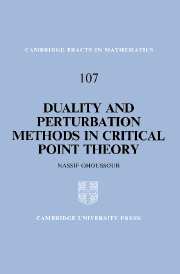Book contents
- Frontmatter
- Contents
- Preface
- Introduction
- Chapter 1 Lipschitz and Smooth Perturbed Minimization Principles
- Chapter 2 Linear and Plurisubharmonic Perturbed Minimization Principles
- Chapter 3 The Classical Min-Max Theorem
- Chapter 4 A Strong Form of the Min-Max Principle
- Chapter 5 Relaxed Boundary Conditions in the Presence of a Dual Set
- Chapter 6 The Critical Set in the Mountain Pass Theorem
- Chapter 7 Group Actions and Multiplicity of Critical Points
- Chapter 8 The Palais-Smale Condition Around a Dual Set – Examples
- Chapter 9 Morse Indices of Min-Max Critical Points – The Non Degenerate Case
- Chapter 10 Morse Indices of Min-Max Critical Points – The Degenerate Case
- Chapter 11 Morse-type Information on Palais-Smale Sequences
- Appendices by David Robinson
- References
- Index
Chapter 1 - Lipschitz and Smooth Perturbed Minimization Principles
Published online by Cambridge University Press: 18 December 2009
- Frontmatter
- Contents
- Preface
- Introduction
- Chapter 1 Lipschitz and Smooth Perturbed Minimization Principles
- Chapter 2 Linear and Plurisubharmonic Perturbed Minimization Principles
- Chapter 3 The Classical Min-Max Theorem
- Chapter 4 A Strong Form of the Min-Max Principle
- Chapter 5 Relaxed Boundary Conditions in the Presence of a Dual Set
- Chapter 6 The Critical Set in the Mountain Pass Theorem
- Chapter 7 Group Actions and Multiplicity of Critical Points
- Chapter 8 The Palais-Smale Condition Around a Dual Set – Examples
- Chapter 9 Morse Indices of Min-Max Critical Points – The Non Degenerate Case
- Chapter 10 Morse Indices of Min-Max Critical Points – The Degenerate Case
- Chapter 11 Morse-type Information on Palais-Smale Sequences
- Appendices by David Robinson
- References
- Index
Summary
We start this chapter by stating and proving Ekeland's well known variational principle since it will be used frequently throughout this monograph. We also give some of its lesser known applications to constrained minimization problems that eventually yield global critical points for the functional in question. We introduce the Palais-Smale condition around a set and we present the first of many examples which show its relevance. We give an existence result for nonhomogeneous elliptic equations involving the critical Sobolev exponent, due to Tarantello. We then establish the more recent smooth variational principle of Borwein-Preiss and we apply it to the study of Hartree-Fock equations for Coulomb systems as was done by P.L. Lions. Finally, we follow the ideas of Ghoussoub and Maurey to deal with the more general problem of identifying those classes of functions that can serve as perturbation spaces in an appropriate minimization principle. As an application, we give a result of Deville et al, stating that the perturbations can be taken to be as smooth as the norm of the Banach space involved. We then apply this result to the problem of existence and uniqueness of viscosity solutions for first order Hamilton-Jacobi equations on general Banach spaces.
Ekeland's variational principle
The following theorem will be of constant use throughout this monograph. The applications of this principle to non-linear analysis are numerous and well documented in several books ([A-E], [Ek 1], [De]).
- Type
- Chapter
- Information
- Publisher: Cambridge University PressPrint publication year: 1993



